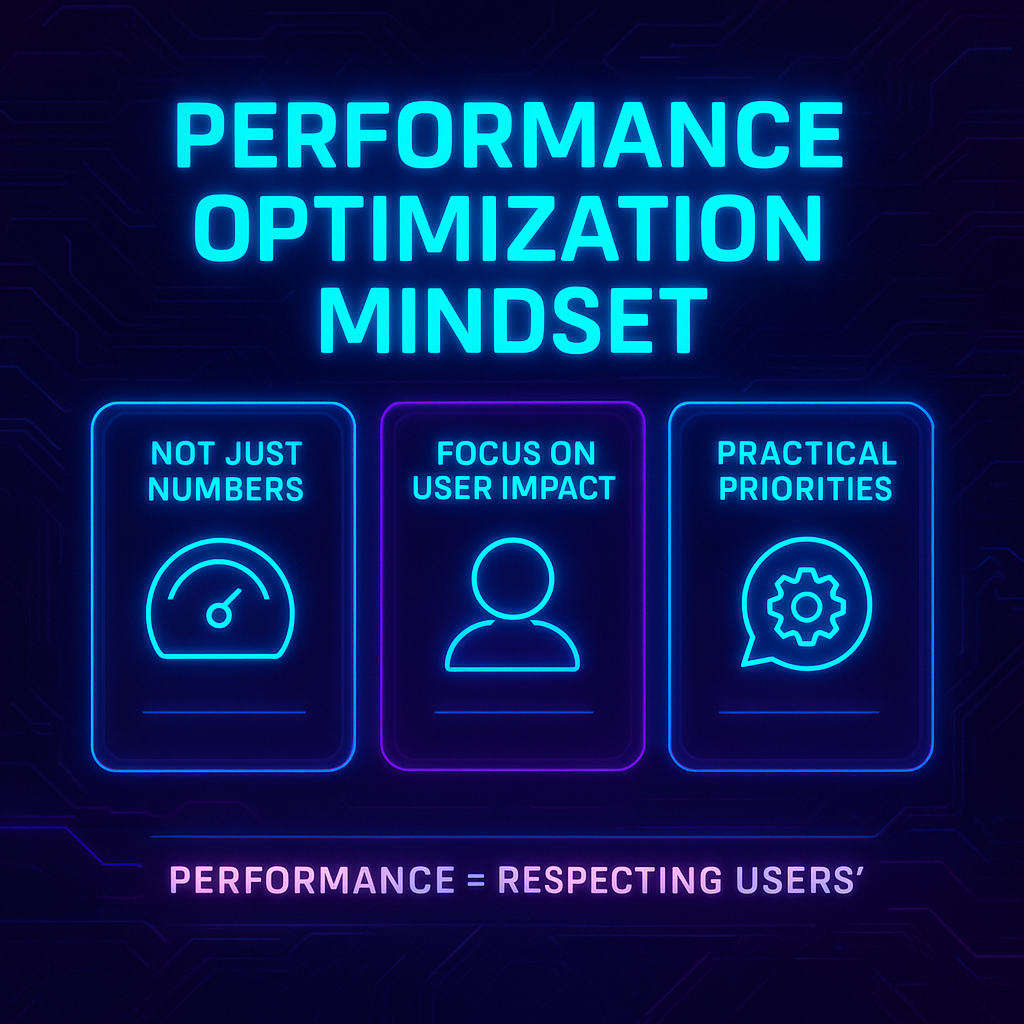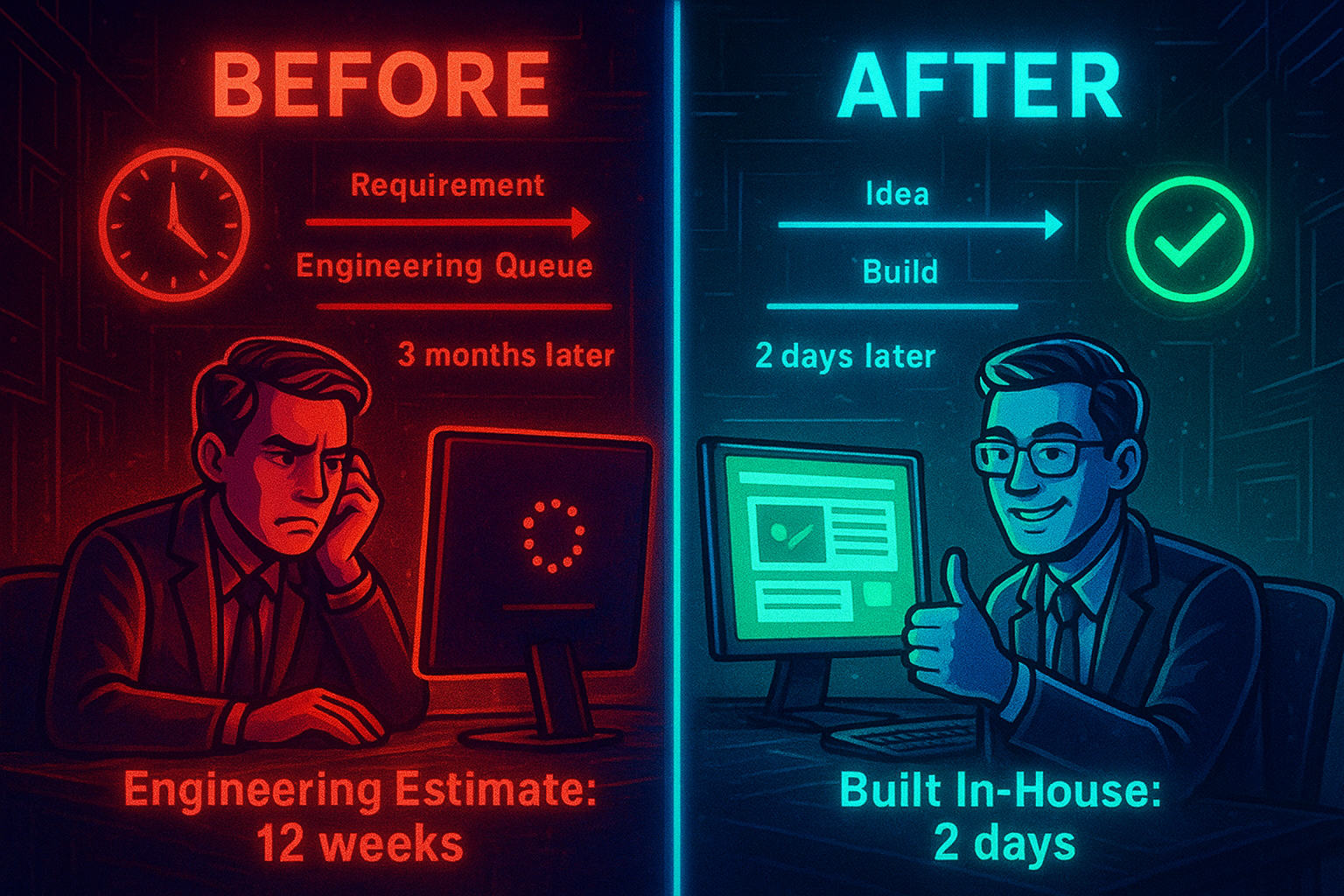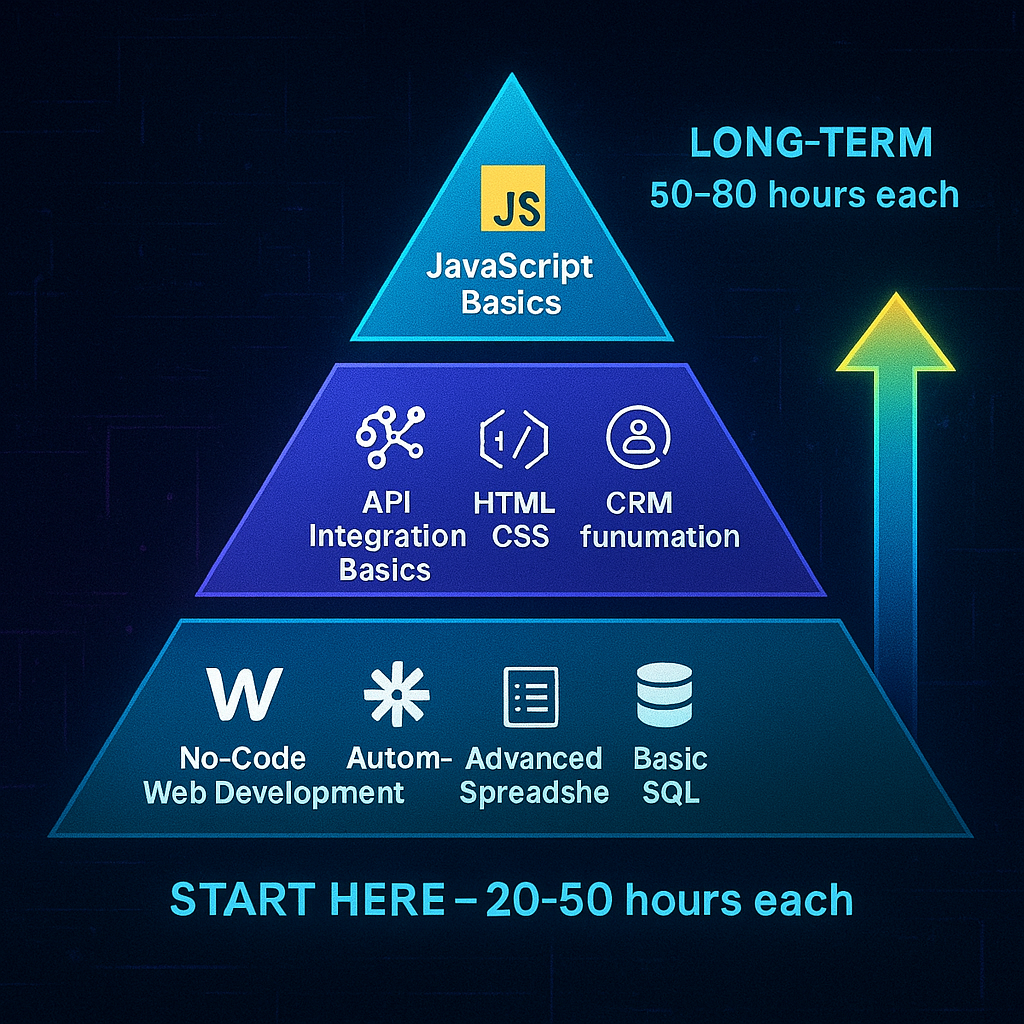Here's something most leadership teams won't tell you: your COO's inability to understand the technical systems running your business is costing you millions. While everyone's focused on hiring data scientists and software engineers, companies are overlooking a critical gap—operations leaders who can actually understand, implement, and optimize the technology they depend on every day.
I learned this the hard way. As COO of a tech startup, I watched our company struggle with a disconnect between what operations needed and what engineering could deliver. The turning point came when I realized I was making strategic decisions about tools and systems I fundamentally didn't understand. That's when I decided to learn Webflow, dive into automation tools, and build the technical literacy that modern operations leadership demands.
If you're a COO, VP of Operations, or aspiring to these roles, this post will show you why technical skills aren't optional anymore—and exactly how to start building them without becoming a full-time developer.
The Changing Role of the COO
From Administrator to Architect
The COO role has evolved dramatically over the past decade. Twenty years ago, a COO focused primarily on process documentation, team management, and operational efficiency. Today's COO is expected to be an architect of technological systems that scale across the entire organization.
This shift isn't subtle—it's fundamental. Modern COOs are expected to:
- Evaluate and implement SaaS tools across marketing, sales, and operations
- Design automation workflows that eliminate manual processes
- Understand data infrastructure well enough to make strategic decisions
- Communicate effectively with engineering teams about technical requirements
- Build no-code/low-code solutions when engineering resources are constrained
The operations leaders who thrive in 2025 are those who can bridge the gap between business strategy and technical execution. You don't need to become a software engineer, but you absolutely need technical literacy.
The Cost of Technical Illiteracy
Let me share a real scenario from my time as COO. Our sales team needed a better way to qualify leads before passing them to account executives. Marketing wanted custom forms with conditional logic. Engineering said it would take three sprints to build.
Because I had learned Webflow and basic automation, I built the solution myself in two days. The result: a custom lead qualification system that saved the company approximately $45,000 in engineering time and got results three months faster.
This wasn't about being a hero—it was about understanding the tools well enough to know what was possible without engineering resources. That's the power of technical skills for operations leaders.

Why Technical Skills Matter for COOs
1. Speed of Execution
When you understand the technical tools at your disposal, you can implement solutions immediately instead of waiting for engineering capacity. This is especially critical in startups and growth-stage companies where engineering resources are always constrained.
I've seen operations projects that should take weeks dragged out for months because they require engineering time. By developing technical skills, you can:
- Build landing pages and forms without waiting for developers
- Create automated workflows using tools like Zapier or Make
- Set up tracking and analytics to measure what matters
- Deploy quick-win solutions while engineers focus on core product
2. Better Communication with Technical Teams
One of the most valuable outcomes of learning technical skills is the ability to communicate effectively with your engineering team. When you understand concepts like APIs, webhooks, database structures, and authentication, you can:
- Write better technical requirements
- Understand technical constraints and tradeoffs
- Participate meaningfully in technical discussions
- Reduce miscommunication that leads to wasted development time
In my current work as a Webflow developer, I regularly work with clients who lack this technical literacy. The difference in project efficiency between clients who "get it" and those who don't is dramatic—easily 2-3x in terms of time and budget.
3. Competitive Advantage in the Job Market
Here's a truth that surprised me: when I started interviewing for operations roles after developing my technical skills, I became a significantly more attractive candidate. Companies are desperate for operations leaders who can think strategically AND execute technically.
I competed as a finalist for a Lead Website Developer role at HoneyBook (salary range: $175-220K) specifically because they needed someone who could "manage like an owner" while implementing technical solutions without engineering dependencies. That hybrid skillset is rare and valuable.
4. Cost Reduction Through Self-Sufficiency
Every time you can solve an operations challenge without hiring expensive developers or consultants, you're directly impacting the bottom line. Over my career, I estimate that technical skills have saved companies I've worked for over $200,000 in outsourced development costs.
This includes:
- Building internal tools and dashboards
- Creating marketing websites and landing pages
- Implementing automation workflows
- Setting up analytics and tracking systems
- Deploying CRM configurations and integrations

What Technical Skills Should COOs Learn?
Not all technical skills are created equal for operations leaders. You don't need to master advanced algorithms or system architecture. Focus on skills that directly amplify your operations capabilities:
Essential Skills (Start Here)
1. No-Code Web Development (Webflow)
- Why: Build marketing sites, landing pages, and internal portals without code
- Time investment: 20-40 hours to functional proficiency
- ROI: Immediate ability to launch web projects without engineering
2. Automation Tools (Zapier, Make)
- Why: Connect your tools and eliminate manual data entry
- Time investment: 10-20 hours to build useful workflows
- ROI: Hours saved per week on repetitive tasks
3. Spreadsheet Advanced Functions
- Why: Better data analysis and modeling capabilities
- Time investment: 15-25 hours to master key functions
- ROI: Faster insights and better decision-making
4. Basic SQL
- Why: Query your database directly instead of waiting for reports
- Time investment: 30-50 hours to practical competence
- ROI: Faster access to data for strategic decisions
Intermediate Skills (Next Level)
5. API Integration Basics
- Why: Understand how your tools connect and exchange data
- Time investment: 20-30 hours
- ROI: Better vendor evaluation and technical conversations
6. HTML/CSS Fundamentals
- Why: Customize marketing tools and understand web technologies
- Time investment: 30-40 hours
- ROI: More control over digital presence
7. CRM Configuration (HubSpot, Salesforce)
- Why: Optimize your revenue operations systems
- Time investment: 25-40 hours depending on platform
- ROI: Better funnel management and reporting
Advanced Skills (Long-Term Development)
8. JavaScript Basics
- Why: Add custom functionality to websites and tools
- Time investment: 50-80 hours to useful competency
- ROI: Significantly expanded technical capabilities
9. Data Visualization (Google Data Studio, Tableau)
- Why: Create executive dashboards and reporting systems
- Time investment: 30-50 hours
- ROI: Better communication of business metrics

How I Made the Transition: A Practical Roadmap
When I decided to develop technical skills as a COO, I didn't have endless time or resources. Here's the practical approach I followed—and the same roadmap I recommend to other operations leaders:
Phase 1: Foundation (Months 1-2)
Week 1-4: Webflow Mastery
- Enrolled in Webflow Masterclass 4.0 (Flux Academy)
- Built 3 practice projects: personal portfolio, landing page, simple blog
- Rebuilt my company's website to get hands-on experience
- Time commitment: 2 hours daily
Week 5-8: Automation Foundations
- Completed Zapier certification
- Built 5 automation workflows for actual business needs:
- Lead capture to CRM
- Form submissions to Slack notifications
- New customer onboarding email sequences
- Internal task assignments
- Data synchronization between tools
- Time commitment: 1.5 hours daily
Key Learning: Start with tools you'll use immediately. Don't learn programming languages in isolation—learn by solving real problems you face every day.
Phase 2: Application (Months 3-4)
Projects Completed:
- Redesigned company marketing website (Webflow) - saved $15,000 in agency costs
- Built lead qualification system with conditional forms - increased MQL conversion by 23%
- Automated customer onboarding workflow - reduced onboarding time from 4 days to 45 minutes
- Created executive dashboard connecting Salesforce + Google Analytics + Stripe
Time Commitment: 5-8 hours weekly
ROI: Approximately $50,000 in cost savings + faster time-to-market for key initiatives
Phase 3: Advanced Development (Months 5-12)
Skills Added:
- JavaScript fundamentals (freeCodeCamp)
- API integration basics (Postman + documentation reading)
- Google Tag Manager for advanced tracking
- Advanced Webflow interactions and CMS
Key Achievement: By month 8, I was interviewing for senior developer roles at tech companies. By month 12, I had completed Webflow projects for paying clients earning $3,000-7,000 per project.
Common Objections (And Why They're Wrong)
"I Don't Have Time"
This is the objection I hear most often. Here's the reality: you're already spending time managing technical projects and waiting for engineering resources. Learning technical skills is an investment that pays dividends immediately.
My calculation: I spent approximately 250 hours over 12 months developing technical skills. Those skills have saved me at least 500+ hours in the years since by enabling me to implement solutions directly instead of coordinating with developers.
The math works. You're not adding new work—you're trading coordination time for implementation time, and you're getting faster results.
"That's Not a COO's Job"
The definition of a COO's job has changed. If you think your role is limited to process documentation and team management, you're operating with an outdated playbook.
Modern COOs are expected to:
- Evaluate and implement technology solutions
- Design scalable operational systems
- Reduce dependence on engineering for operations tools
- Move fast and solve problems independently
Technical skills aren't a deviation from the COO role—they're essential to executing it effectively in 2025.
"I'm Too Old to Learn Coding"
I learned Webflow development in my 30s. I've worked with operations leaders in their 50s who successfully developed technical skills. Age isn't the barrier—mindset is.
You're not becoming a software engineer. You're learning practical tools that make you better at your existing job. And the learning curve for modern no-code and low-code tools is dramatically shorter than traditional programming.
Real-World Examples: Technical Skills in Action
Case Study 1: Marketing Website Redesign
The Problem: Our marketing team needed a new website. The agency quote: $25,000 and 8 weeks delivery time.
The Solution: I built it myself in Webflow over 2 weeks working nights and weekends.
The Results:
- Cost: $0 (internal time) vs $25,000 (agency)
- Timeline: 2 weeks vs 8 weeks
- Ongoing: We could make updates instantly instead of paying hourly agency rates
The Key: Because I had learned Webflow, I could execute immediately without external dependencies.
Case Study 2: Lead Qualification System
The Problem: Sales was wasting time on unqualified leads. Marketing wanted a custom qualification flow with conditional logic based on responses.
The Traditional Approach: Engineering estimated 3 sprints (6 weeks) to build the custom forms and logic.
My Approach: Built it in Webflow with custom form logic and Zapier automation in 2 days.
The Results:
- Saved approximately $12,000 in engineering time (based on loaded developer cost)
- Deployed 6 weeks faster
- Increased qualified lead conversion by 18%
Case Study 3: Executive Dashboard
The Problem: Leadership wanted a single dashboard showing key metrics from Salesforce, Google Analytics, and Stripe.
The Traditional Approach: Engineering would build custom integrations—estimate was 2-3 months.
My Approach: Used Zapier + Google Sheets + Data Studio to create automated dashboard in 3 days.
The Results:
- No engineering time required
- Dashboard updates in real-time
- Leadership has visibility into metrics they never had before
- Total cost: ~$100 in tool subscriptions vs $30,000+ in development
How Technical Skills Complement Operations Expertise
The most powerful aspect of developing technical skills as an operations leader isn't just the execution capability—it's how technical knowledge enhances your strategic thinking.
Better Vendor Evaluation
When evaluating SaaS tools and vendors, I can now:
- Assess technical capabilities accurately
- Understand integration possibilities and limitations
- Identify potential implementation challenges early
- Negotiate better contracts because I understand what's technically feasible
Improved Process Design
Technical literacy allows me to design processes with implementation in mind from the start. Instead of creating workflows that "sound good" but are technically impractical, I design systems I know can be built efficiently.
Faster Problem-Solving
When operational issues arise, I can often implement temporary solutions immediately while permanent fixes are developed. This agility is incredibly valuable in fast-moving startups and growth-stage companies.
Credibility with Technical Teams
Engineering teams respect operations leaders who understand technical constraints and possibilities. This credibility makes cross-functional collaboration dramatically more effective.
Getting Started: Your First 30 Days
Ready to begin developing technical skills? Here's a practical 30-day plan to get started:
Week 1: Foundation
Days 1-3: Assessment
- List the top 5 operational challenges you face that require technical implementation
- Identify which could be solved with no-code tools (Webflow, Zapier, Airtable)
- Sign up for free trials of relevant tools
Days 4-7: Learning Platform Setup
- Create accounts on Webflow, Zapier, and YouTube
- Watch introduction tutorials for each platform
- Join relevant communities (Webflow Facebook group, Zapier community)
Week 2-3: Hands-On Learning
Goal: Build one real project
Webflow Path: Build a simple landing page (10-15 hours)
- Follow Webflow 101 tutorial
- Recreate your company's homepage
- Add a contact form with Zapier integration
Automation Path: Create 3 working automations (5-8 hours)
- Form submission → Email notification
- New customer → Onboarding email sequence
- Task completion → Slack notification
Week 4: Application
Goal: Solve one real business problem
Take one of the challenges from Week 1 and implement a solution using your new skills. This could be:
- A new landing page for a marketing campaign
- An automated workflow that eliminates manual work
- A form or intake process that improves data collection
Key Principle: Learn by doing. Don't spend months in tutorial hell—start building real solutions immediately.
Resources for COOs Learning Technical Skills
Webflow Learning
- Webflow Masterclass 4.0 & 5.0 (Flux Academy) - Comprehensive training I personally completed
- Webflow University - Free official tutorials
- Finsweet - Advanced Webflow techniques and resources
Automation
- Zapier University - Free certification program
- Make Academy - Alternative to Zapier with visual automation builder
General Technical Skills
- freeCodeCamp - Free coding education (HTML, CSS, JavaScript)
- Codecademy - Interactive coding tutorials
- LinkedIn Learning - Professional development courses
Communities
- Webflow Forum - Active community for questions and support
- NoCode Reddit - Discussions about no-code tools and strategies
- IndieHackers - Community of builders and operators
Frequently Asked Questions
How long does it take to become technically proficient as a COO?
You can reach functional proficiency in no-code tools like Webflow and Zapier within 30-60 hours of focused learning. This typically translates to 2-3 months working 30 minutes to 1 hour daily. For more advanced skills like JavaScript or API integration, expect 3-6 months of consistent practice. The key is starting with tools you'll use immediately, which accelerates learning through real application.
Do I need a computer science degree to learn these technical skills?
Absolutely not. I have an Associate's degree in Business Administration and successfully learned Webflow development, automation, and basic programming. Modern no-code and low-code tools are specifically designed for non-programmers. The focus should be on practical application rather than theoretical computer science knowledge. Start with tools that solve real problems and learn what you need as you go.
What's the ROI of learning technical skills as an operations leader?
Based on my experience, the ROI is substantial. I've calculated approximately $200,000 in direct cost savings over 3 years from being able to implement solutions without hiring developers or agencies. Beyond direct savings, there's significant value in faster time-to-market (weeks instead of months), better communication with technical teams, and increased marketability for senior operations roles. Most operations leaders see positive ROI within 6-12 months.
Should I learn Webflow or WordPress for website development?
For operations leaders, I strongly recommend Webflow over WordPress. Webflow provides a visual development environment without requiring PHP or complex plugin management. It's faster to learn, produces cleaner code, and requires less ongoing maintenance. WordPress is more powerful for certain use cases, but Webflow hits the sweet spot for operations leaders who need to build and deploy quickly without deep technical knowledge.
Can I learn these skills while working full-time as a COO?
Yes—I did exactly this. The key is consistency rather than long blocks of time. I dedicated 30 minutes to 2 hours daily, typically early morning or late evening. By focusing on building real solutions for actual business problems, the learning felt productive rather than burdensome. The alternative—waiting for engineering resources or paying agencies—often takes more of your time in coordination and project management anyway.
What if my company already has developers? Why should I learn technical skills?
Even with dedicated engineering resources, technical skills enhance your effectiveness as an operations leader. You'll write better requirements, communicate more effectively with your technical team, understand technical constraints that impact business decisions, and implement quick solutions that don't require engineering time. Engineers should focus on core product and high-value technical challenges, not building internal tools or marketing websites—tasks you can handle with no-code skills.
How do I convince my CEO that developing technical skills is a good use of my time?
Frame it in terms of ROI: faster execution, reduced dependency on constrained engineering resources, cost savings from not hiring agencies, and better strategic decisions from understanding technical capabilities. Share specific examples of operational challenges that could be solved more quickly with technical skills. Most CEOs will be supportive once they understand you're not abandoning operations strategy—you're enhancing it with execution capability.
Conclusion: The Future of Operations Leadership
The line between operations and technology continues to blur. In five years, I predict that technical literacy will be a baseline requirement for COO roles, not a differentiator. The operations leaders who thrive will be those who can think strategically about business problems AND implement technical solutions to solve them.
Key Takeaways:
- Technical skills amplify operations expertise - You don't become a developer; you become a more effective operations leader
- Start with no-code tools - Webflow, Zapier, and Airtable provide immediate value without deep programming knowledge
- Learn by solving real problems - Don't spend months in tutorial mode; implement solutions to actual business challenges
- The ROI is substantial - Cost savings, faster execution, and better strategic decisions justify the time investment
- It's not optional anymore - Technical literacy is becoming baseline for operations leadership roles
The journey from traditional operations leader to technical operations leader took me about 12 months of consistent learning and application. Looking back, it's one of the best professional investments I've made.
Ready to start building technical skills? The fastest path is to identify one operational challenge you're currently facing and commit to solving it using a no-code tool. Don't overthink it—just start building.
If you're looking for guidance on how operations thinking translates into better technical implementation, particularly for web development projects, check out my Webflow services. I work with businesses to build websites and systems that actually solve operational challenges, not just look good.
